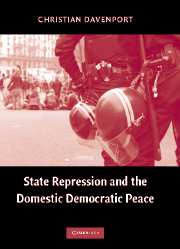Book contents
- Frontmatter
- Contents
- Figures
- Tables
- Preface
- State Repression and the Domestic Democratic Peace
- INTRODUCTION
- 1 REPRESSION AND THE SEARCH FOR PEACE
- 2 DISAGGREGATION AND CONTEXTUALIZATION
- 3 DATA AND METHODOLOGY
- 4 DEMOCRATIC PACIFICATION: THE DIRECT EFFECTS OF VOICE AND VETO
- 5 PEACE UNDER FIRE: THE INTERACTIVE EFFECT OF DEMOCRACY AND CONFLICT
- 6 (RE)CONSIDERING DOMESTIC PEACE
- Appendix I
- Appendix II
- Bibliography
- Index
- Titles in the series
INTRODUCTION
Published online by Cambridge University Press: 24 July 2009
- Frontmatter
- Contents
- Figures
- Tables
- Preface
- State Repression and the Domestic Democratic Peace
- INTRODUCTION
- 1 REPRESSION AND THE SEARCH FOR PEACE
- 2 DISAGGREGATION AND CONTEXTUALIZATION
- 3 DATA AND METHODOLOGY
- 4 DEMOCRATIC PACIFICATION: THE DIRECT EFFECTS OF VOICE AND VETO
- 5 PEACE UNDER FIRE: THE INTERACTIVE EFFECT OF DEMOCRACY AND CONFLICT
- 6 (RE)CONSIDERING DOMESTIC PEACE
- Appendix I
- Appendix II
- Bibliography
- Index
- Titles in the series
Summary
Rwanda For Francois Xavier Byuma, the vice president of Rwanda's premier human rights organization – The League for Promotion and Defense of Human Rights (LIPRODHOR) – July 15, 2004, could not have been more puzzling. On that day, as he issued a statement to diverse news agencies, the government of Rwanda officially closed the doors of his thirteen-year old organization, accusing it of “divisionism” and promoting mass killing. What made the closing of LIPRODHOR especially puzzling was the fact that after having survived civil war, genocide, and dictatorship, it was shut down once the “minimal” establishment of democracy had been achieved.
The fate of LIPRODHOR was not what one would have expected. One year following the onset of civil war in 1990, the Hutu organization was created in an effort to monitor the repressive practices of the then Hutu-led government. Its initial denunciations of human rights violations were directed against diverse authorities: specifically, between 1990 and 1993, they targeted the authoritarian government of President Juvenal Habyarimana and from April 9 to July 19, 1994, the transitional government of President Theodore Sindikubwako and those associated with it such as Colonel Theoneste Bagosora and the Interahamwe. During this period, LIPRODHOR was heavily criticized and received numerous threats from the government. Indeed, it appeared that the organization would be eliminated at any time, but this was not the case. Rather, its efforts were delayed and disrupted but never fully ended.
- Type
- Chapter
- Information
- State Repression and the Domestic Democratic Peace , pp. 1 - 32Publisher: Cambridge University PressPrint publication year: 2007

